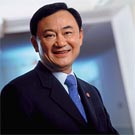Thai protestors demand Britain extradite convicted premier
 Bangkok - Hundreds of protestors descended on the British embassy in Bangkok Thursday to demand the extradition of convicted former prime minister Thaksin Shinawatra from London to face a two-year jail term in Thailand.
Bangkok - Hundreds of protestors descended on the British embassy in Bangkok Thursday to demand the extradition of convicted former prime minister Thaksin Shinawatra from London to face a two-year jail term in Thailand.
An estimated 1,500 followers of the People's Alliance for Democracy (PAD), which has been staging anti-government protests since May, marched Thursday after Thaksin was sentenced October 21 on an abuse-of-power conviction.
"We want England to send Thaksin back to Suvarnabhumi Airport, but this time, we want him to lick the ground and not just bow to it," said Somkiat Pongpaiboon, a key leader of the PAD.
Somkiat was referring to Thaksin's triumphant return to Thailand in February after 17 months in self-imposed exile, also in London, when the ousted premier got down on his knees and paid homage to his homeland on the sidewalk outside Bangkok's international airport in a widely televised event.
Thaksin and his wife, Pojaman, fled to London again on August 11 to avoid various legal proceedings against them, the latest of which was Thaksin's conviction last week by the Supreme Court of Political Office Holders.
"Thaksin Shinawatra must thus be brought back to Thailand not simply to face the Supreme Court's ruling but also, and more importantly, to help secure the future of justice in the country," the PAD said in a letter passed over to British Ambassador Quinton Mark Quayle.
Thaksin has rejected the court verdict against him as being politically motivated and part of a campaign to destroy him by "privileged elites who believe in anything but democracy," the former premier said in a letter to the international media last week.
"I am a threat to them because I represent the principle of liberal democracy," said Thaksin, who is remembered in Thailand both for his efforts to monopolize state power during his 2001-2006 term as prime minister and for his populist policies that won him a huge following among Thailand's poor.
The PAD, a loose coalition of groups opposed to Thaksin and any attempt to return him to power, derided Thaksin's letter.
"He is still one of Thailand's richest and most powerful persons," the PAD letter said. "However, he still claims that the 'privileged elite' is set to destroy him. In reality, it is he who is a leading member of the 'various groups of privilege elites' that quite literally control Thailand."
Thaksin, a billionaire former telecommunications tycoon, has divided Thai society like no politician before him.
He came to power on a populist platform that won him and his Thai Rak Thai Party the firm backing of Thailand's rural and urban poor while his CEO management style initially earned him the respect of many middle class Thais and the business community.
The political tide turned on Thaksin in early 2006 when she sold his family's share in Shin Corp, the Shinawatra business empire, to the Singapore government's Temasek Holdings in a tax-free deal that outraged many Thais.
Thaksin was toppled in a bloodless coup on September 19, 2006, by the military, which changed him with corruption, dividing the nation, and undermining the institutions of democracy and the monarchy.
Despite living in exile, Thaksin continues to pull the strings of power in Thailand through the People Power Party (PPP), which leads the current coalition government.
Prime Minister Somchai Wongsawat is Thaksin's brother-in-law, and many members of the PPP are Thaksin's close political allies.
The PAD has vowed to continue its protests until Somchai is forced to resign and the government falls.
Its protests have already led to several bloody clashes, the last of which was on October 7 when police fired tear-gas canisters on a PAD demonstration. Two PAD members were killed in the melee and more than 400 injured.
Early Thursday, a bomb was thrown at PAD followers gathered at Makkahawan Bridge in Bangkok, injuring at least nine people, one of them seriously. (dpa)